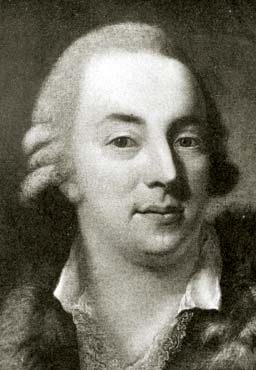Get Today in Masonic History into your Inbox. Sign up today for one of our email lists!
Need an article for your Trestleboard/Newsletter see our Use Policy
Giacomo Girolamo Casanova is Born

Today in Masonic History Giacomo Girolamo Casanova is born in 1725.
Giacomo Girolamo Casanova was an Italian adventurer and writer.
Casanova was born on April 2nd 1725 in Venice, Italy. The city at the time of his birth was on the "must" list for any young European man on his Grand Tour, a tradition of traveling around Europe. It is probably the environment there which helped to form who Casanova later became. By his own description his parents were disinterested in him. He was largely raised by his grandmother before being sent away to a boarding school. In his memoirs he wrote of his being shipped off to boarding schools "So they got rid of me." At boarding school he was taken in by a priest and his family. The priest taught there. It was in the priest's home where he had his first sexual experience at the age of 11 with the priest's younger sister, who was still much older than Casanova. In 1742, he graduated from the University of Padua with a law degree, which he hated but utilized it through much of his life.
Casanova traveled back and forth between Padua and Venice. On a chance encounter, he saved the life of a senator, who later became his patron. When the senator was felled in a gondola, which they shared with some other men, with a stroke, Casanova leapt into action. He watched as a physician who was summoned failed to help, pushing the physician aside, he went to work on the senator, reviving him when the physician decleared he was going to die. The senator believed Casanova possessed an occult knowledge and wanted him close. He said he wished he had been allowed to become a doctor instead of a lawyer stating "I should have been allowed to do as I wished and become a physician, in which profession profession quackery is even more effective than it is in legal practice."
Casanova who was barely out of his teens already found himself in trouble due to his sexual appetites. He was kicked out of one patrons home for having a sexual relationship with a young woman who his patron already had his eye on. Before long he left Venice and headed to France, before traveling across Europe. he began gambling heavily and found himself on several occasions thrown in jail for his debts or forced to flee a country. A similar situation occurred on his first trip to Paris. He essentially slept his way into Paris and drew the attention of police.
By the age of 30, Casanova was back in Venice. This time the local authorities didn't allow him to get away with his behavior. He was arrested and placed in a high security jail reserved for political and high profile prisoners. At first in solitary confinement he was eventually allowed to take walks around the grounds. As the story goes, told in his writings a couple of times, he found a metal bar and a stone with which to sharpen it. He then used it in two escape attempts. The first was in his original cell where he had began cutting through the floor with the bar. Before he used the hole to escape, he was moved and then he and a renegade priest used the bar to escape. Some scholars are skeptical of this story, while others claim there is some historical evidence to at least imply the story is true. No matter how he got out of the cell he ended up spending the next two decades in exile from Venice.
During his exile, Casanova traveled again around Europe, starting in Paris. There he became the head of the state lottery, an idea he had come up with. Casanova made a fortune, unfortunately he very quickly lost the fortune as well. He began traveling around trying to convince other countries to utilize his state lottery ideas. He found no takers, although his travels allowed him to further his sexual escapades. Eventually he traveled to Rome and sought permission to return to Venice. He was given permissions and he returned to his home. Again it was short lived, and he headed back out on the road.
In 1783, Casanova met Benjamin Franklin in Paris. Franklin was not the only prominent man and mason he met in his second round of travels. He also met Voltaire who he eventually got into a philosophical battle. He also met Mozart. At the time Casanova met Mozart, Mozart was composing his opera Don Giovanni, which essentially held a mirror up to Casanova's life. It is unknown how he reacted to seeing his life being shown as immoral, it is claimed he wrote lines for Don Giovanni but they were not used.
Casanova spent his remaining days in Bohemia, a shell of the out going man he once was. In 1797, he received word the state of Venice no longer existed after Napoleon had taken it over. Casanova passed away on June 4th, 1798.
Casanova joined Freemasonry on his first trip to Paris. He was fascinated by the rituals of the fraternity. He used his masonic connections over and over again as he traveled around Europe and tried to ingratiate himself to the local nobility. Casanova was a member of Lodge of the Duke of Clermont.
This article provided by Brother Eric C. Steele.

